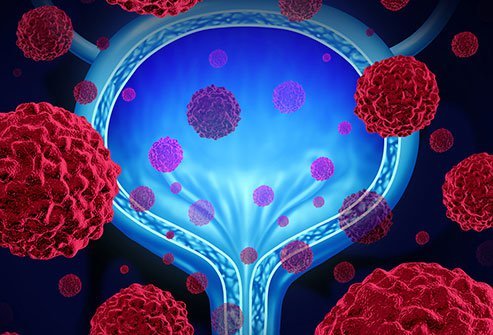What Causes Bladder Cancer in Females?
- What Are Different Types ?
- What Are The Stages ?
- Signs/ Symptoms
- How Is It Diagnosed ?
- Treatment
- Prevention
Bladder cancer is cancer that begins in the cells of the urinary bladder. The urinary bladder is a hollow muscular organ in the lower abdomen that is responsible for the storage of urine filtered by the kidneys. Bladder cancer is a common urologic cancer that has the highest recurrence rate of any malignancy. Bladder cancer is more common in men compared to women. However, the causes and risk factors of bladder cancer are the same in women and men.
Bladder cancer is caused when deoxyribonucleic acid (DNA) in the cells of the bladder mutate or change, disabling the functions that control cell growth. This results in uncontrolled, abnormal growth and multiplication of cells in the bladder. The exact cause of the mutations is unknown. Several factors can increase the risk of bladder cancer in men and women.
Risk factors for bladder cancer
Smoking cigarettes, cigars or pipes cause harmful chemicals to accumulate in the urine. These harmful chemicals may damage the lining of the bladder, increasing the risk of developing cancer. Other risk factors include
- Exposure to cancer-causing chemicals, especially the industrial solvents
- Chronic bladder infections
- Low fluid consumption
- Male gender
- Old age, the majority of bladder cancers occur in people older than 55 years
- High-fat diet
- Family history of bladder cancer
- Previous treatment with a chemotherapy drug called Cytoxan
- Previous radiation therapy to treat cancer in the pelvic area
What are the types of bladder cancer?
Different types of cells in the bladder can become cancerous. The type of cell where cancer begins determines the type of bladder cancer. They include
- Urothelial carcinoma: Urothelial carcinoma, previously called transitional cell carcinoma, is the most common type of bladder cancer that occurs in the cells that line the inside of the bladder.
- Squamous cell carcinoma: Squamous cell carcinoma is associated with chronic irritation of the bladder caused by an infection or long-term use of a urinary catheter. Squamous cell bladder cancer is more common in parts of the world where the parasitic infection, schistosomiasis, is a common cause of bladder infections.
- Adenocarcinoma: Adenocarcinoma begins in cells that make up mucus-secreting glands in the bladder. Adenocarcinoma of the bladder is rare.
What are the stages of bladder cancer?
Doctors assign the stage of bladder cancer by combining the T, N and M classifications.
- Tumor (T): The size and location of the tumor.
- Node (N): The tumor spread to the lymph nodes.
- Metastasis (M): Determines cancer spread to other parts of the body.
The stages of bladder cancer indicate the following.
- Stage 0 bladder cancer hasn’t spread past the lining of the bladder.
- Stage I bladder cancer has spread past the lining of the bladder, but it hasn’t reached the layer of muscle in the bladder.
- Stage II bladder cancer has spread to the layer of muscle in the bladder.
- Stage III bladder cancer has spread into the tissues that surround the bladder.
- Stage IV bladder cancer has spread past the bladder to the neighboring areas of the body.
What are the signs and symptoms of bladder cancer?
Many people with bladder cancer at first may have painless, bloody urine. Most often, bladder cancer is diagnosed after a person finds blood in the urine. Several symptoms might indicate bladder cancer, such as fatigue, weight loss and bone tenderness; these can indicate more advanced disease. The common symptoms include
- Blood or blood clots in the urine
- Pain or burning sensation during urination
- Frequent urination
- Feeling the need to urinate many times throughout the night
- Feeling the need to urinate but not being able to pass urine
- Lower back pain on one side of the body
How is bladder cancer diagnosed?
Bladder cancer can be diagnosed in the following ways.
- Urinalysis
- An internal examination
- Cystoscopy, which involves inserting a narrow tube that has a small camera on it through the urethra to visualize the bladder
- Biopsy uses a small tool that is inserted through the urethra to take a small sample of tissue from the bladder to test for cancer
- A computed tomography (CT) scan
- An intravenous pyelogram
- X-ray imaging
How is bladder cancer treated?
The doctor will work with the patient to decide what treatment to provide based on the symptoms, type and stage of the bladder cancer, as well as the patient’s overall health. In general, the main treatment options for bladder cancer are
- Surgery
- Chemotherapy
- Immunotherapy (local and systemic)
- Targeted therapy
- Radiation therapy
How can bladder cancer be prevented?
Although there is no guaranteed way to prevent bladder cancer, taking certain steps can help reduce the risk, such as

